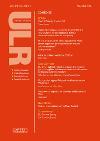Utilities Law Review - Volume 23 - Issue 3

Articles
The UK Subsidy Control Bill
Cosmo Graham
Leicester Law School, University of Leicester
The aim of the Bill is to provide a system of subsidy control post-Brexit which is consistent with the UK’s international obligations but will allow subsidies to be delivered in a more streamlined manner without facing excessive bureaucracy. For example, unlike the EU regime, which has a general prohibition on State Aid with numerous exceptions and exemptions, the Subsidy Control Bill has specific, rather than general, prohibitions. Although the Bill is complex it really only provides a framework for subsidy control withmany of the detailed provisions to be filled in later. Future legal interpretations around, for example, the meaning of subsidy will also be critical.
The EU Commission publishes its draft VBER: a new blueprint for distribution in the EU
Pauline Kuipers, Ariane Le Strat and Dr Jörg Witting
Bird & Bird LLP, The Hague, London and Düsseldorf
This article provides a detailed examination of the EU’s draft Vertical Agreement Block Exemption Regulation, due to enter into force on 1 June 2022, and its implications forcurrent distribution agreements. It also indicates how current UK thinking on supply chain agreements appears to be diverging from the EU model.
At the cross-roads of utility regulation in Malta: should regulators be empowered to impose punitive sanctions?
Paul Edgar Micallef
University of Malta
The utility regulators in Malta – the Malta Communications Authority and the Regulator for Energy and Water Services – are empowered by law to impose regulatory sanctions against non-compliant utility service providers. All this, however, may change in the light of the Federation of Estate Agents v Direttur Generali (Kompetizzjoni) et, a landmark judgment by the Constitutional Court of Malta where that court held that punitive sanctions by the Director General (Competition) were in breach of the Constitution of Malta on the grounds that such sanctions should be imposed only by an independent and impartial court. This article discusses the impact of this judgment on utility regulation and the measures that may be taken to ensure effective regulation.
What do utilities need from COP26?
Tallat Hussain
White & Case LLP, London
In the aftermath of COP 26, the utilities sector finds itself struggling to balance the disruptive impacts of climate change on its operations with its role in achieving the Paris Agreement goals. This article looks at the needs of the utilities sector as the world transitions to a low carbon future with sustainable development at its core.
Case Comment
EU Court upholds highest European Commission gun-jumping fine: interim covenants and information exchanges under the spotlight
Philipp Girardet, Rahul Saha, Kyle Le Croy and Addiped Cheng
Willkie Farr & Gallagher LLP, London
The €124.5 million ‘gun-jumping’ fine imposed on Altice Europe NV by the European Commission has been reduced by €6 million on appeal to the General Court, but remains the highest in merger cases to date. This comment provides details of the infringing conduct in question.
Competition Appeal Tribunal certifies class action against Mastercard
Jamie Tomlinson and William Allison
DAC Beachcroft, London
In August 2021 the CAT re-heard a petition to certify a class action against Mastercard and granted a Collective Proceedings Order enabling the lead claimant to sue Mastercard on behalf of 46.2 million people. The claim must now overcome the evidential hurdle of establishing causation.
New laws to regulate the provision of electricity in Malta
Paul Micallef,
University of Malta
Malta has enacted the Electricity Regulations 2021 and Act No. XLIX of 2021, amending the Regulator for Energy and Services Act.
Book Review
Telecommunications Law in New Zealand (Robert Clarke and Sean Mosby).
EU Current Survey
Edited by Peter Alexiadis
Visiting Professor, King’s College, London and Brussels and
and Christoph Rabb
Wolf Theiss Rechtsanwälter GmbH & Co
KG, Vienna
Energy – Telecommunications and Digital Economy – Transport.
UK Current Survey
Edited by Philippa Young
Solicitor, Oxford
Broadcasting – Energy – Post – Telecommunications – Transport.
